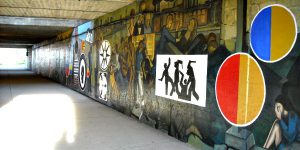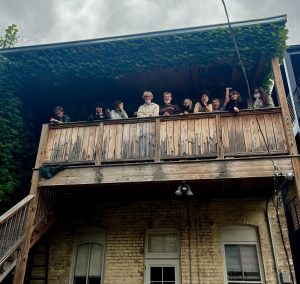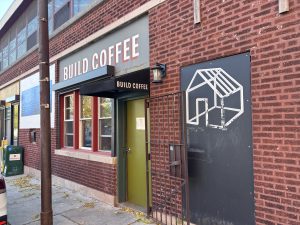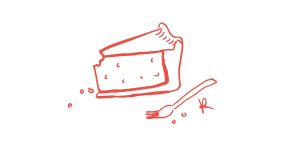Department of Urban Speculation is an architectural organization that takes to the streets. Duct tape, disco ball motors, shovels, or plywood — they’ll use whatever it takes to explore questions regarding Chicago’s urban environment. Their project-based attitude lands them in spaces traditionally occupied by art: Pilsen’s Show Pods, the Museum of Contemporary Art (they show in the 12×12 space in May), and the city streets themselves. Though officially a UIC-affiliated think tank, the twenty or so architecture students and faculty that make up the department call themselves “subversive bureaucrats,” “professional amateurs,” and somewhat flippantly say they aim to build “a new Chicago School.” Confused? So was I.
Last week I sat down with Alex Lehnerer, Meghan Funk, and Jared Macken, the heads of the Department, to figure out what makes their organization tick.
Zachary Johnson (ZJ): How did the Department of Urban Speculation come to be? What was the inspiration behind it?
Alex Lehnerer (AL): Well, first of all the name is a little weird because we are not really a department; we are a quasi-department. I have learned that it’s officially not possible to call yourself a department. My…impression so far of Chicago is that it is a highly institutionalized city, so the way you cope with it is you’re totally against it or you yourself become some type of institution. So, the ambition here is to become an institution and to act as subversive bureaucrats…and speculate about architecture and the current state of our city. Last year we had some ideas of what we wanted to do, so Megan [Funk], Jared [Macken], and I launched the department.
Meghan Funk (MF): Our aspiration[s] [are] focus[ing] on competitions, inter-curricular work, but [also] we wanted to provide an active outlet for [students] and to take advantage of the energy that students have to act and test things and do experiments.

AL: Exactly. We like to offer opportunities for extra-curricular action. So, if you’re a student here you’re bound to the curriculum — we wanted to give them something outside of that.
[Our work is] always very general. It’s not something metaphysical – it’s very, “what you see is what you get”. One thing that’s always very important is that we don’t get too difficult or too theoretical.
We try to distinguish ourselves in that we don’t work around some decided position, that’s why it might seem a little confusing. It’s more than one type of mission that we are about. Right now we’re in the place to grow through projects. We are too young at the moment to have that kind of strong mission, but I think the great thing about this void is that it allows us to see what we are actually interested in. So, we are very project oriented.
MF: We don’t have a mission statement, but we have some agendas.
AL: I think that there are some things that are common to all of us, but we’re not bound to “we only do this or that.” I think that is helpful.
ZJ: What is the structure of the Department of Urban Speculation? How is the work divided? Would you call yourselves a think tank?
AL: Well, if you want to call us something then we are a think tank, but we do things as well so–
ZJ: A “do tank” then?
AL: (laughs) [Our work] always needs to result in some product. That’s really important. Whether that’s an exhibition, a book, or an object, etc. There always needs to be some final product which then can also be enjoyed independently. We don’t try to be imposing with our thinking; [that] is very important.
We have ideas. They come from us or they come from other people who do some project with us, and then we form teams. They work then as little task forces to flesh out projects. So, we are not a kind of hierarchical organization. I think people are interested the most when they have a responsibility in [a] project. Either they have come up with the idea or they are actively participating. I think that’s the most important thing to have. So, it’s a pretty horizontal organization.
MF: There is some structure in that obviously there are some students and we’re faculty at the school, so we…facilitate the opportunities to investigate or speculate on things. Like if [students] come up with a project…we [gather] around that and …the three of us help provide some structure. So, it is very flat, but there is a little bit of structure…it’s really mobile.

ZJ: What is your process for generating ideas?
MF: Sometimes it comes from the world at large, but… other times, ideas are student–generated or we have a kind of rough idea or rough question to ask students and from there we develop something.
AL: Of course we also [think] in regards to Chicago as a city. We ask ourselves, “What’s so great about it?”
ZJ: You use the term New Chicago School on your website. How do you feel the city of Chicago informs your work?
AL: Well, the Chicago School thing is first of all a sort of provocation, but why not?
MF: And I think it sets a good claim for us. It can be good if you set the standards really high.
AL: What’s good about [Chicago is that it] doesn’t consider itself the best city in the world. I think it’s really terrible that whenever people talk about the identity of Chicago they say, “Why is it not New York or Los Angeles?” I’m really totally amazed by that. I’m not…from here, so I can’t say anything. I’m an outside observer, but I think the Midwest in general and Chicago as one main city in the Midwest is something pretty fascinating, and it doesn’t need to always be compared with those other places. And I would do anything for it to be considered something on its own.
ZJ: So, you aren’t a fan of that second city mentality?
AL: Yeah, it’s horrible.
ZJ: I understand that these projects are very open in that you don’t have a firm mission, but do you have a way that you intend to change perceptions of the city or urban life in your projects? Is there some kind of goal there?
MF: I don’t know if we’re trying to change people.
AL: Well we don’t want to be didactic. I think the difference is very important. We’re not trying to change the perceptions, so much as to change the focus.
MF: But I don’t think we’re trying to change the focus of the city. It’s for ourselves. We’re investigating and experimenting. More than doing it for other people, we’re doing these things for ourselves and then showing that work.
Jared Macken (JM): And people can project themselves onto the work. For me that’s valuable. We’re not saying that we’re changing people. People can still be themselves.
AL: We cannot change the world with architecture. But of course we can make a contribution…that gives us a kind of freedom to be unconventional.

ZJ: Do you think you’re trying to raise questions among people?
AL: No.
MF: I think that we’re asking questions.
AL: But at the same time we try to answer them.
MF: We want to try to ask questions and then stage a project to look into that.
AL: Rhetorical questions.
ZJ: With rhetorical answers?
AL: (laughs) Yeah. That’s good.
JM We try to be subjective.
AL: In order to have a project of your own you always have to have a problem statement, otherwise it’s hard to do anything. Even if it’s not a real problem, you have to construct a problem.
MF: It’s more of a provocation than a problem.
AL: Yeah. A provocation — it starts a discussion. There’s a discourse on control now that’s been around for 15 or 20 years, and people have tried to change things through building in the urban environment, but it hasn’t changed anything. We have to somehow accept that kind of thing and maybe work a little with it. You can’t always try to be offensive and try to work against it.
MF: You don’t always have to fight things. I think that’s why we use the term subversive bureaucrats. Instead of us all having to fight against it, we can get into it. Maybe by getting into it more, we’d understand it and subvert it to our own agenda. We don’t want to be negative and we don’t have to rail against anything. We’re just trying to understand what we’ve got going on here and operate from that.
I think that our work is about Chicago in that we’re trying to operate in Chicago as Chicago…
ZJ: So, you can’t help but be informed by the city?
MF: Exactly.
This interview has been edited for length and clarity. For more information on the Department of Urban Speculation, visit their website.




